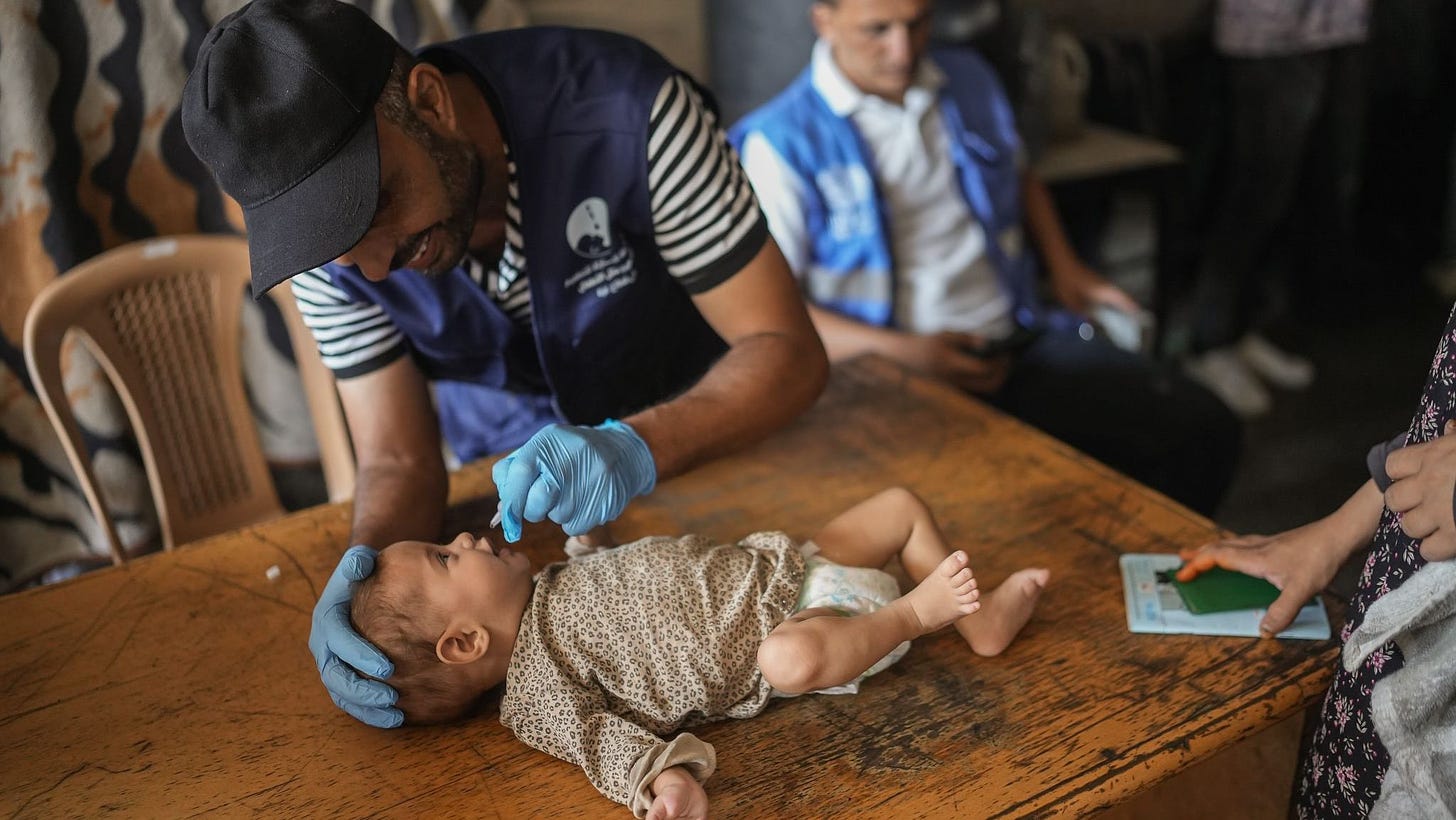Polio Vaccination Underway in Gaza
Still, Child Health Remains Dependant on Peace
Over 2,000 health workers have launched the first phase of a polio vaccination campaign in the Gaza Strip, working amid temporary “humanitarian pauses” agreed upon by the Israeli occupation. The World Health Organization (WHO) pushed for the urgent campaign after a 10-month-old child was diagnosed with polio in August, marking the first case in the region in decades. Public health experts have long warned that Gaza’s deteriorating living conditions, worsened by the ongoing conflict, create fertile ground for the resurgence of infectious diseases like polio.
“I actually don’t know how to describe how I am feeling; my only son, getting this disease,” said the child’s mother to United Nations (UN) officials. “He’s not able to stand still, or crawl like he used to do before; my son was able to crawl all around the place.”
By Wednesday 4 September, around 187,000 children in central Gaza had received their first dose of the vaccine. Thousands more are expected to be vaccinated in the coming days, with the campaign moving to southern and northern areas. Until now, the vaccination drive involved approximately 400 fixed locations, while 300 mobile teams worked to reach even more locations.
Families have queued at vaccination sites, responding to appeals to protect children, but health workers faced the challenge of working under unstable conditions despite the temporary pause in fighting. The campaign is a vital step to prevent a wider polio outbreak, but the WHO has emphasized that real progress can only be achieved through lasting peace. “Humanitarian pauses are welcome, but ultimately, the only solution to safeguard the health of the children of Gaza is a ceasefire,” said WHO Director-General Tedros Adhanom Ghebreyesus.
The reemergence of polio in Gaza has increased fears about the conditions in the public health system, strained by almost a full year of direct attacks and destruction. Israeli Occupation Forces (IOF) have destroyed Gaza’s water and sanitation systems, and as the rainy season approaches, this is increasing the risk of flooding, exacerbating the spread of diseases. The UN has warned that areas like Jabalyia and Beit Lahia are particularly at risk of health crises if the sewage overflows.
Local and international organizations have been working on rebuilding Gaza’s healthcare and sanitation infrastructure even amid ongoing attacks, and have recently managed to bring at least glimmers of hope. Al Shifa Hospital, Gaza’s largest, has managed to reintroduce partial services after it had been virtually destroyed during an Israeli military siege early this year. While such events are a welcome addition to Gaza’s overwhelmed health system, health services are still reliant on unpredictable aid deliveries due to Israeli restrictions on the entry of medical supplies and fuel.
Some key treatments, such as cancer therapy and specialist pediatric care, were suspended early in the conflict and have yet to resume. The limited availability of basic medical supplies and energy has left many hospitals unable to predict how long they can continue providing care, or which type of care they will be able to provide. These concerns have now increased in the West Bank too, as the IOF besieged and blocked access to ambulances in key health facilities.
In the light of this, international health workers and organizations have called for more decisive support to Gaza’s healthcare system. In a letter addressed to the UK government, 30 health workers who previously volunteered in Gaza and other occupied Palestinian territories called for a full arms embargo on Israel, describing the dire conditions in Gaza’s hospitals. “The hospitals where we worked were starved of basic supplies, from surgical materials to soap. They were regularly cut off from electricity and internet access, denied clean water, and operated at four to seven times their capacity,” the letter states.
Echoing the sentiments of WHO Director-General Tedros, the health workers emphasized that lasting peace is the only true path to rebuilding Gaza’s healthcare system. Until peace and liberation are achieved, health in Palestine will remain under severe threat.





